The people who fled Tigray
Just a few weeks ago, they worked as doctors, teachers, artists. One couple were newlyweds. Then the shooting and the shellfire started.Photos and text by Will Swanson
24 December 2020
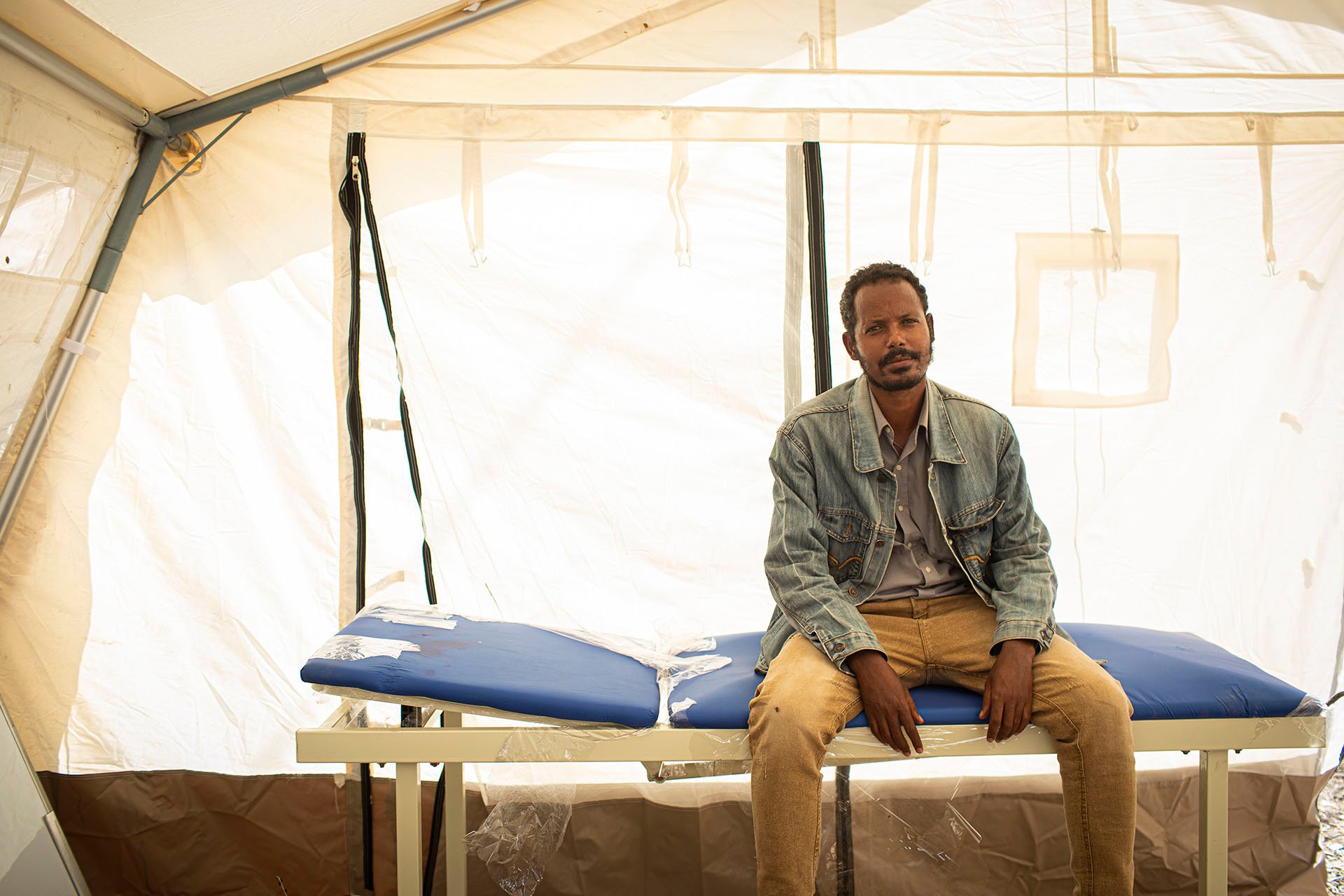
Daryelowm, 40, was a working as a specialist at a hospital in Western Tigray when he was forced to flee.
The people who fled Tigray
Just a few weeks ago, they worked as doctors, teachers, artists. One couple were newlyweds. Then the shooting and the shellfire started.
Photos and text by Will Swanson
24 December 2020
Daryelowm, 40, was a working as a specialist at a hospital in Western Tigray when he was forced to flee.
Over 50,000 people have fled violence in Ethiopia’s northern Tigray region in November and December, seeking safety across the border in Sudan.
They trek to remote border points, terrified, exhausted but relieved, after walking long distances over harsh terrain. Many of those fleeing are women and children, often with nothing but the clothes they were wearing.
The steady stream of new arrivals initially overwhelmed humanitarian agencies’ current capacity to provide aid, and the efforts to help them have only just begun. Urgent needs include food, water, shelter, sanitation and health care.
The lives of those who fled have been shattered. None of them thought they would ever be refugees and have to leave a lifetime of investment, hard work and family behind.
These are their stories.
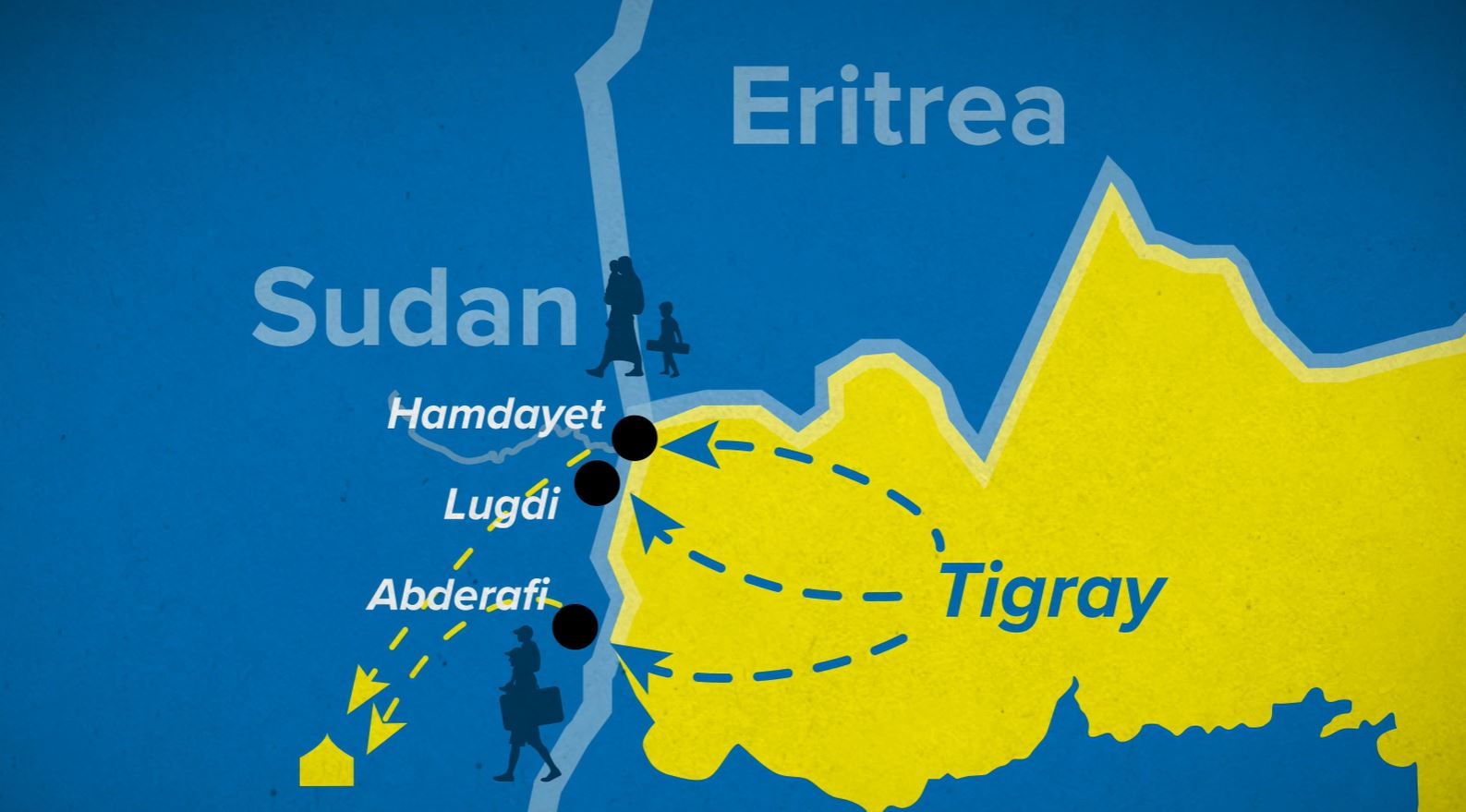
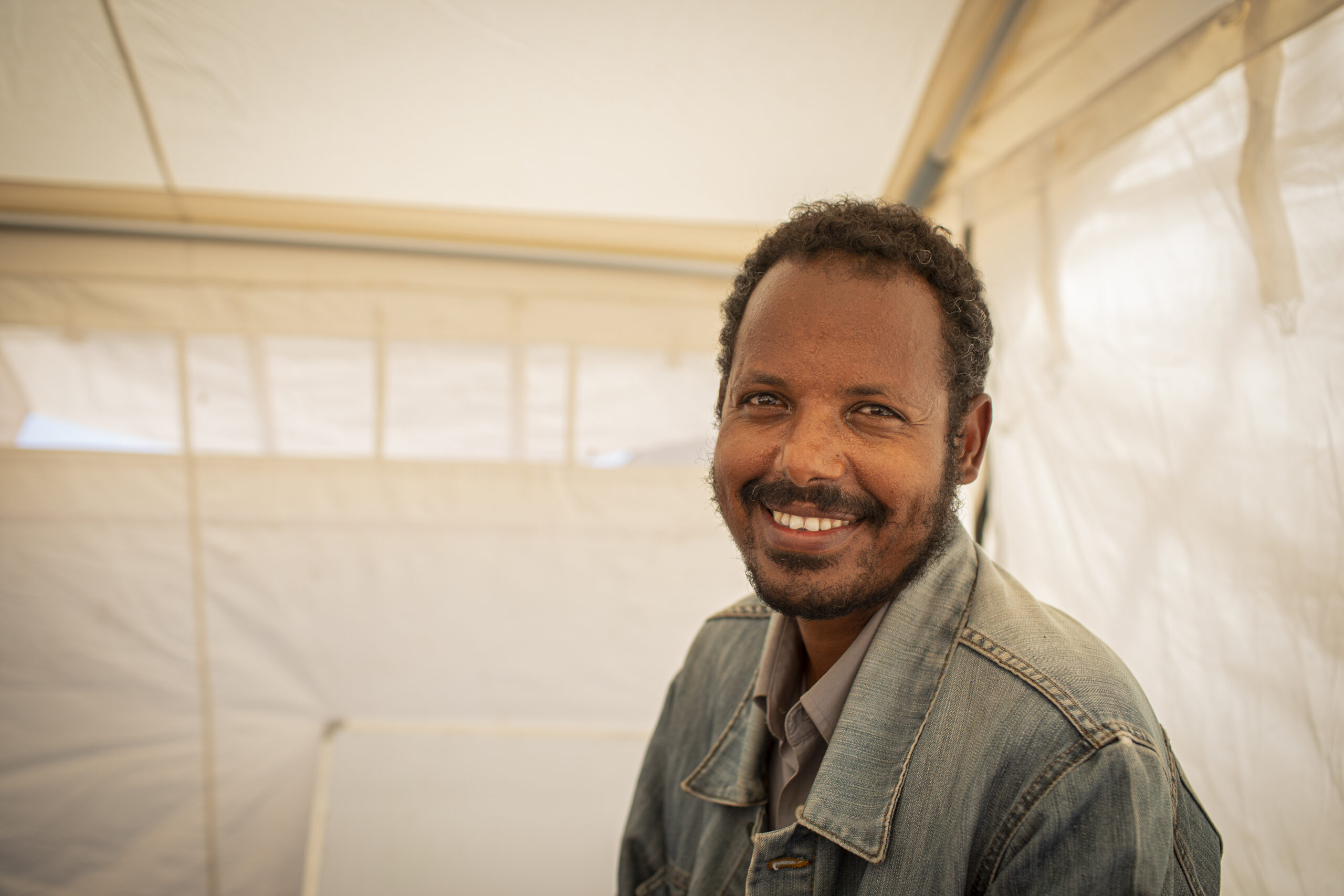
The Doctor
“I had a pretty nice job. It was peaceful and I was in the right place.”
—Daryelowm, 40
Dr. Daryelowm had worked as a specialist for nearly four years at a hospital in western Tigray before he was forced to flee. He arrived at ‘Village 8’, a Sudanese settlement near the border and got to work. He pulled together a group of doctors, nurses, pharmacists and even a veterinarian, to help the newcomers in need.
“We started off working out of a house, using scraps of paper as scripts for the patients,” he says. The Sudanese government came in later and gave them supplies.
Daryelowm was having a regular workday when everything changed in Tigray. “It was a busy day and then I heard the blasts like ‘boom boom boom!’ We heard there were civilians who had been wounded by the bombings,” he recalls.
When the shelling intensified, he joined the hundreds of people leaving town. “People were leaving without anything, just rushing away to save their own lives.”
They travelled in tractors, crossing the border into Sudan. The next day, he went to work with his scratch team of volunteers, treating hundreds of people. The most common ailments are malaria, pneumonia and typhoid. The hours are long and resources are stretched. But he isn’t ready to give up.
“We have to fight to the end. We can’t give quality care like this, but we can give something, some basic care to the people who are here,” he says.
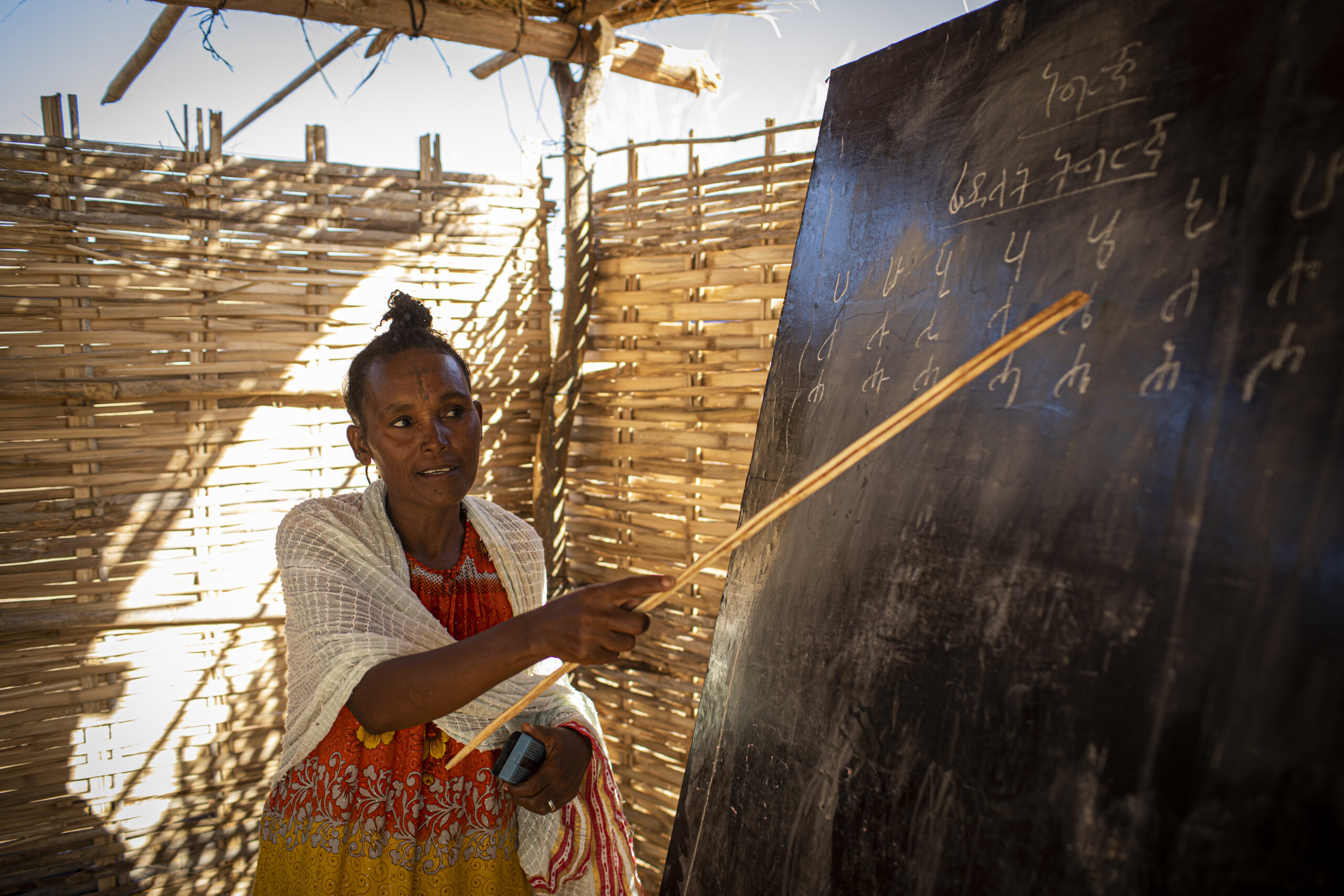
The Teacher
“To build a generation through teaching is a great role. I’m proud because I can shape the future.”
—Ngesti, 28
A light sheet covers part of the 10-foot by 10-foot shelter where Ngesti and her family currently live in Um Rakuba Camp. At least the shade keeps out the hot sun. Inside the shelter, Ngesti makes some coffee. A few small bags of clothes for the children and a small pile of rations provided by the World Food Programme are stacked on one side.
After finishing her housework, she holds two classes daily in Tigrinya, her mother tongue, at 08:30 and 15:00 for children in the camp. When there is a food distribution, she must wait in line for rations for her family, so the classes are affected by that. Today, her daughter Adiam is sick – a stomach ache that she thinks could be caused by bad food or water.
“Life was very good, we had a full life. But now we are here,” says Ngesti, who has been a teacher for nine years.
The outbreak of conflict changed everything.
“We were in our house, when we were attacked. Our house was burned. Everything was burned,” she says.
She is grateful for the hospitality of the Sudanese and has offered to volunteer as a teacher, to help the children.
“When I was a child, I wanted to be a teacher because teaching is a great profession,” she says. “To build a generation through teaching is a great role. I’m proud because I can shape the future generation.”
Her greatest need right now is for volunteers to be supported.
“We need better services; we need clothes and food. If we can’t eat, how can we help these children?”
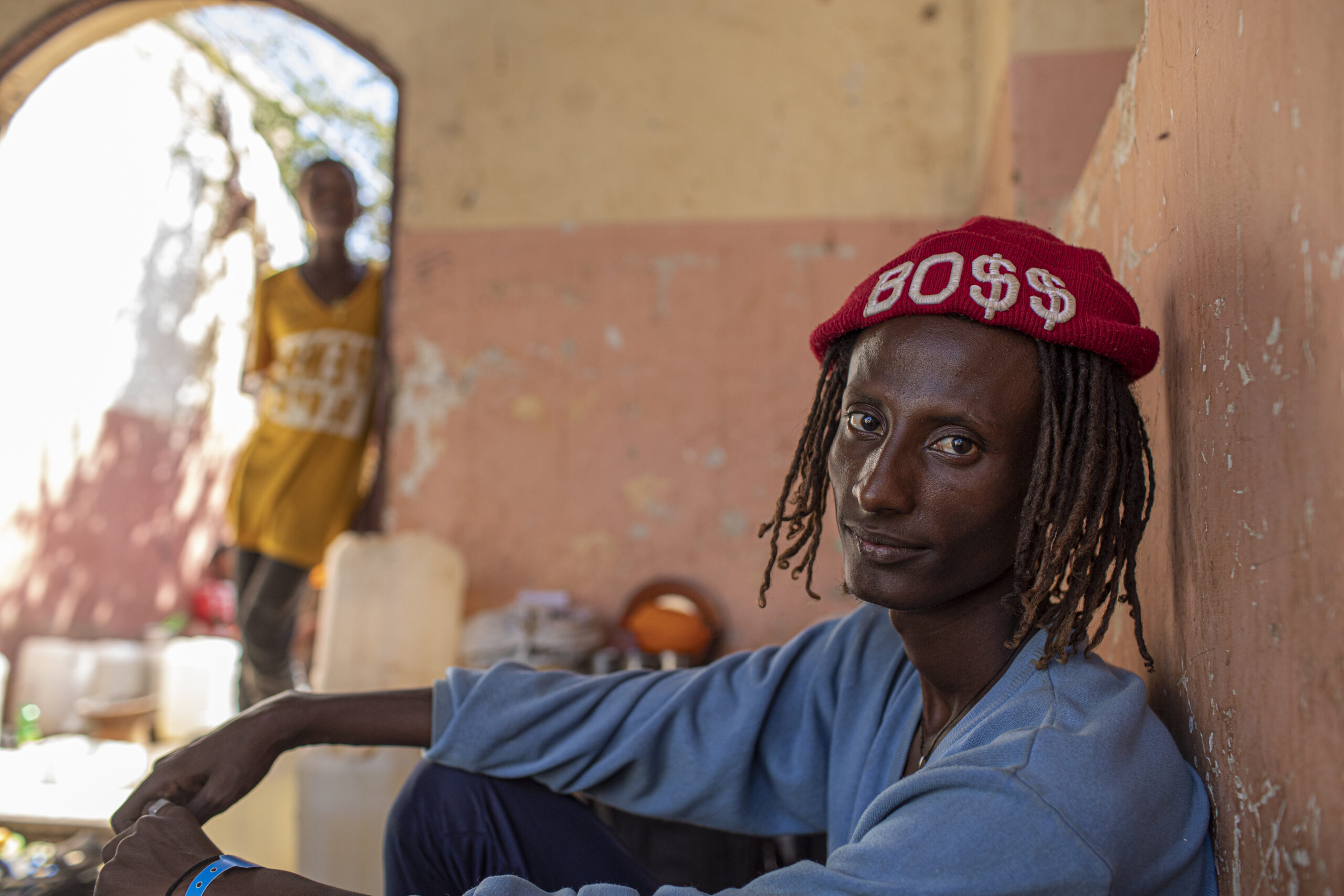
The Artist
“Using my hands passes the time and helps me relax and think about other things.”
—Futsum, 25
Futsum’s current surroundings are a far cry from what he is used to. He sleeps in an abandoned building in the Um Rakuba refugee camp. Back home, he would probably be busy making art, painting, sketching and pursuing his passion for filmmaking.
He doesn’t have much, as he fled with just the clothes he was wearing: a blue shirt, jeans and a red beanie. All he carried was a packet of biscuits and a bottle of water.
Without any of his art supplies, Futsum has started using what he finds around him – metal offcuts, building materials and a used-up welding stick – to carve sculptures out of stone and wood. “It calms my mind,” says Futsum, who gets anxious and sometimes depressed after being displaced.
He explains that he doesn’t make films for the money, but rather to educate people. “I made films about tragedies, about death and how nothing good comes from killing,” he says. “They are about how rational people can solve their problems.”
He enjoys showing his sculptures to others. But more than anything, he wants to return home. “I want to go back and do my art. I also want to continue making movies. You know, many people have forgotten where they came from and I want to make movies to remind them of that,” he smiles.
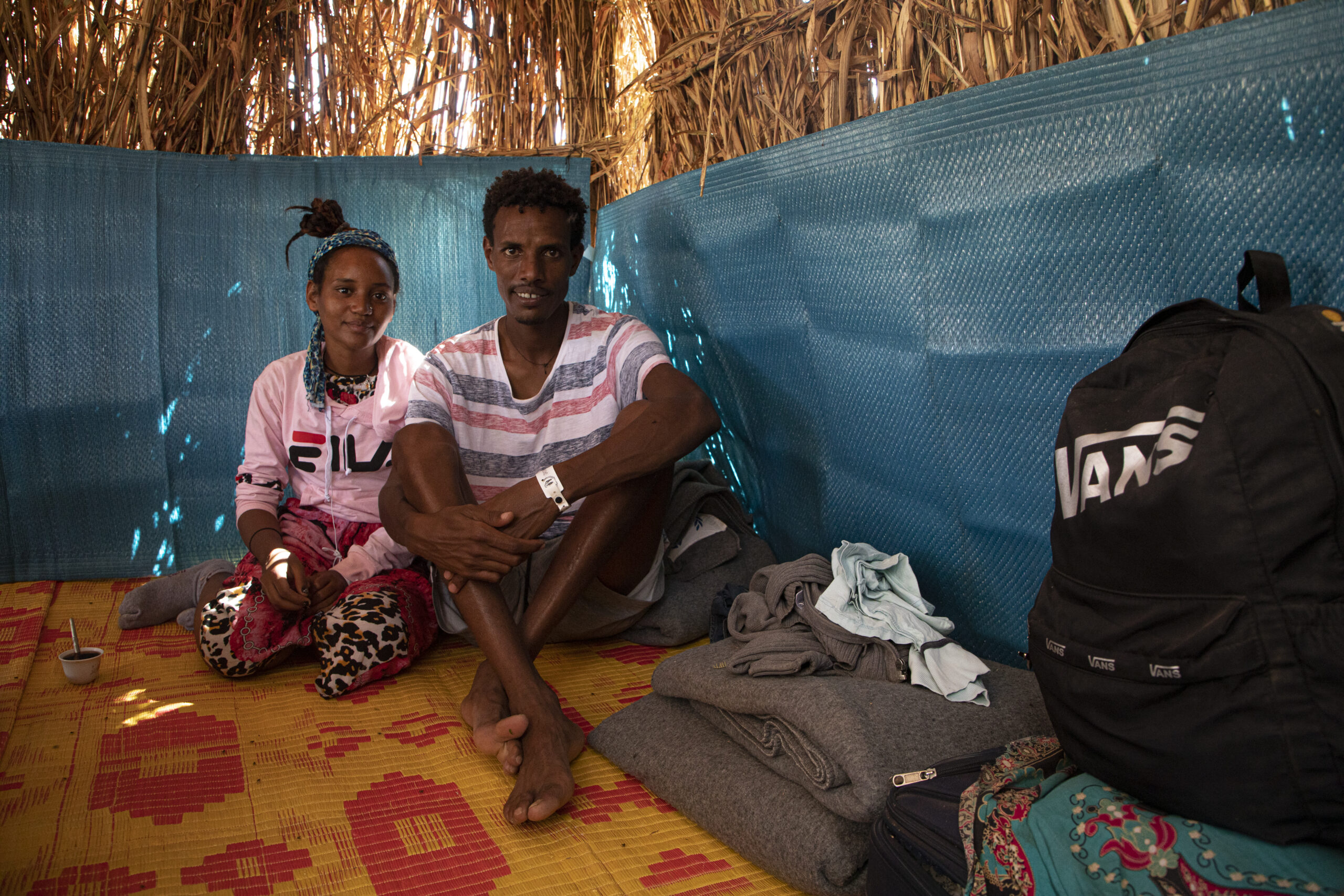
The Newlyweds
“I’m a bit depressed here as we are worried about our family. But at least we are okay and out of the war.”
—Fusuh, 24
Fusuh and Hellen had only been married four months before they had to flee their hometown. Fusuh had just finished college and had started working as a nurse when the crisis erupted.
“We heard the fighting around town then suddenly, heavy gunfire hit the roof of our house, sending sparks and shrapnel everywhere,” he says, adding that a piece of metal from the roof wounded him in his back. “We grabbed what we could and ran for our lives.”
In Um Rakuba, they have set up a simple shelter made from sorghum leaves and stalks beside a large baobab tree. Here, they keep their belongings tidy and well organized. Hellen makes coffee for the stream of visitors who come to greet the popular couple.
Meanwhile, Fusuh has begun volunteering at a local clinic run by Médecins Sans Frontières, along with other doctors and nurses he worked with back home. He is working in triage, helping to decide which patients need emergency treatment.
Although their future is uncertain, the young couple are generous and caring to those around them, doing what they can to make the tough situation better for themselves and their community.
“I’m a bit depressed here as we are worried about our family. But at least we are okay and out of the war,” says Fusuh.
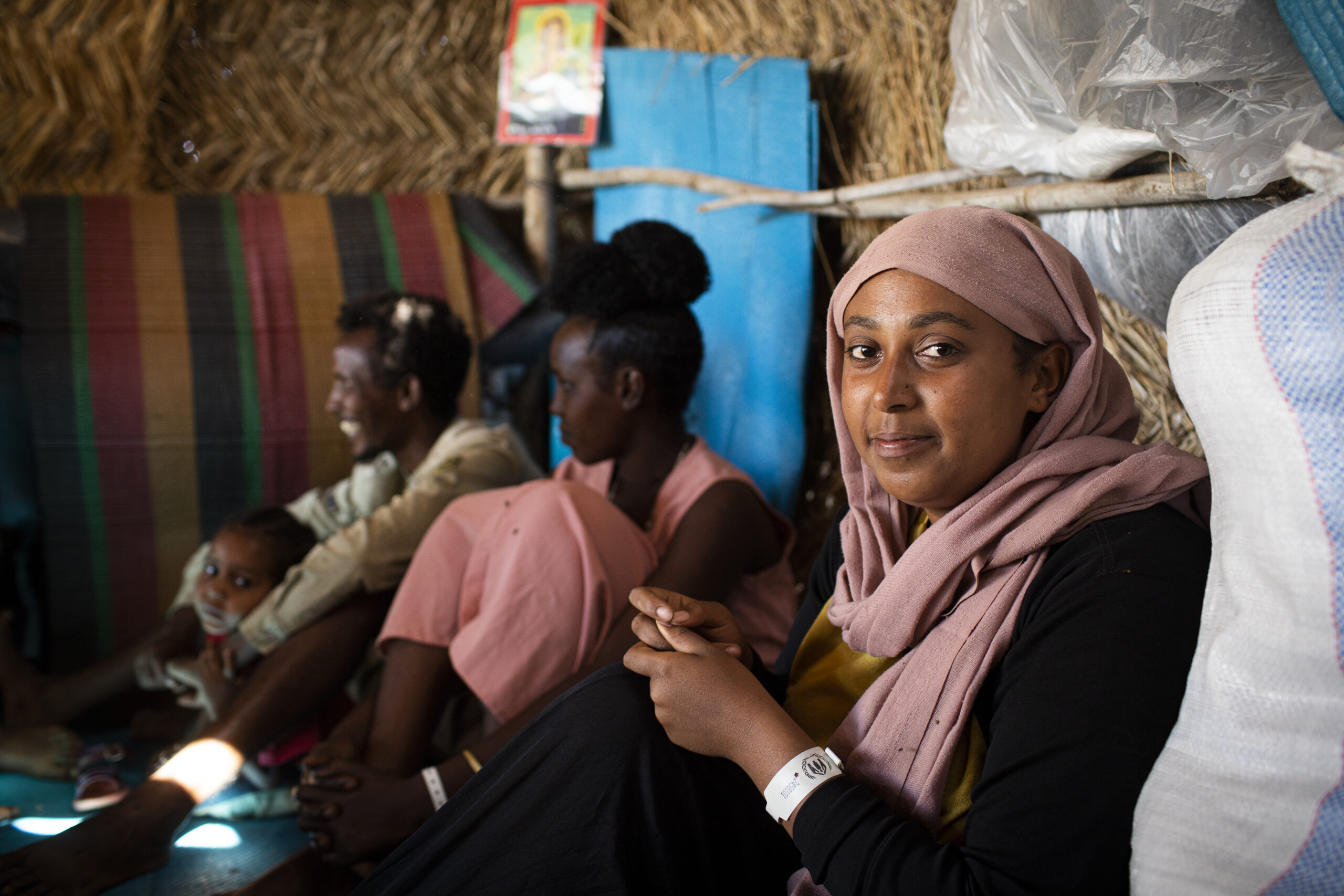
The Businesswoman
“Two weeks after arriving in Um Rakuba, I am still wearing the same clothes I had when I fled Ethiopia.”
—Meserei, 23
Meserei was working at a juice bar in her town when fighting broke out. She saw people running and fleeing, but she kept working.
“Someone came and told me that armed people were coming to kill us, so I ran,” she says.
There was no time to return home to check on her parents and two younger brothers. She just ran for her life, towards the border and to safety.
“I left with nothing – no food, no bags, no clothing. Two weeks after arriving in Um Rakuba, I am still wearing the same clothes I had when I fled Ethiopia.”
Meserei didn’t know anyone here at first, but she has since made friends with some of her neighbours in the large, makeshift shelter where refugees stay when they arrive. She sleeps in one shelter with up to 50 other men, women and children. She is worried about her family as she doesn’t know where they are.
“You know, I’m not okay. I miss my friends, my family and all my clothes. I literally have nothing here!”
She hopes things will get better and she can return home, keep working and save up to support her family.
Profiles compiled by Will Swanson in Um Rakuba camp and Village 8, Sudan. Edited by Catherine Wachiaya.
